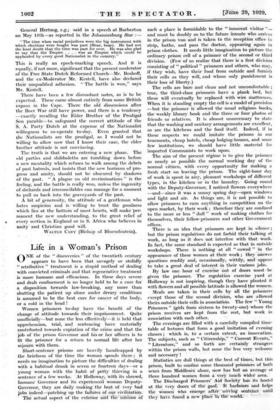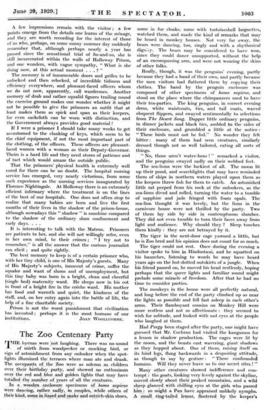Life in a Woman's Prison
af-A NE of the " discoveries " of the twentieth century appears to have been that savagely or stolidly " retributive " treatment is a stupid •method of dealing" with .convicted criminals and that regenerative treatment is more humane. and efficacious. In these days severer and drab confinement is no longer held" to be a cure for' a disposition towards law-breaking, any more than shutting the patient up alone under dreary conditions' is assumed to be the best cure for. cancer of the body, or a cold in the head !
Women prisoners to-day have , the benefit . of the change of attitude towards their imprisonment. Quite unofficially—but none the less effectively—it is held that apprehension, trial, and sentencing have materially contributed towards expiation of the crime and that the jab- of the prison Governor and his or .her officers is to fit the prisoner for a return to normal life after her sojourn with them.
Short-sentence prisons are heavily handicapped by the briefness of the time the woman spends there ; it needs no imagination to picture the difficulties of dealing with a habitual drunk in seven or fourteen days—or a young woman with the habit of petty thieving in a sentence of a few weeks. At Holloway, with its shrewd, humane Governor and its experienced woman "DeputY- GoVernar, .they are daily making-the best of 'very bad. jobs- indeed--:patching up the faillirei of our civiliiation.-- ..The'netual aspect of the exterior and theiritgrior of such a place is formidable to the " innocent visitor "— and- must be doubly so to the future inmate who arrives in the prison van and is taken to the reception 'office to strip; bathe, and pass the doetor, appearing again in prison clothes. 'It needs little imagination to picture the ordinary. prison Cell of a prisoner of the second' or third division. (Few of us realize that there is'a first division Consisting of " political " prisoners and' others, whO may if they wish, have their' fciod from outside and furnish their cells as they will; and whaSe only liunisinrnent is their loss of liberty.) The cells are bare and clean and not uncomfortable ; true, the third-class prisoners have' a plank bed, but these will eventually be-replaced with wire Mattresses: When it is standing empty the Cell is a' model of precision --but the prisoner is' allOwed the 'Usual religious books, the•weekly library book and the three or four photos of friends or relatives. It is almost unnecessary to state that the washing and arrangeinents are excellent, as are the kitchens and the food itself. Indeed, if in these respects we could imitate the prisons in our tenements, cheap hotels, cheap lodging-houses, and some few institutions, we should have little material for imported Communists to- work upon.
The aim- of the present- regime is to give the prisoner as nearly as posSible the normal working day of the normal eitizen, with- every opportunity for making a fresh start• on leairing the prison. The eight-hour day of work is spent in airy, pleasant- workshops of different types, in the kitchen -or' in- 'the laundry. Going round with the Deputy-Governor,Inoticed flowers everywhere —and—since it was a' sunny spring day-Open windows and light and air. As things are, it is not possible to allow prisoners to earn anything -in competition on the open- market, 'by their--work ; therefore they are confined to the more or less "dull " work of making clothes for themselves, their fellow-prisoners and other Government offices.
There is an idea that prisoners are kept in silence ; but the prison regulations do not forbid their talking at work, as long as it does not interfere with that work: In fact, the same standard is expected as that in outside workshops. - There is nothing -at all " cowed " in -the appearance of these women at- their work.; theyanSwer questions readily and, occasionally, wittily, and -appear to take a great deal of- interest in their various jobs. • By law one hour' of exercise - out of doors must -be given the prisoner. The regulation exercise yard at Holloway is not inspiring, though they have planted -it with flowers and all possible latitude is allowed the women.
Meals are taken in their cells' by. all the prisoners except those of the second division, who are alloived theirs outside their cells in association. The few ":Young Prisoners " (girls froin sixteen to twenty-one) whom the prison receives are kept from the rest, but work in association with each other.
The evenings are filled with a carefully compiled time- table of lectures that form a good- imitation of evening classes ; which is, to' a -certain extent, an innovation. The subjects, such as " Citizenship," " Current Events," " Literature," 'and so forth are' 'certainly strangers within the prison walls, but none the less very welcome and necessary ! - - • Statistics are dull things at the best of tithes; but this prison; built to -confine sonic thmisand prisbrieis of both sexes from Middlesex alone, now -has kit an average" of three hundred women frOni 'irerY: much Wider area. - The Discharged 'Prisoners' -Aid.-SOCiety his' its hostel at the. very doors of the'. harbours -and helps the. women` who enierge: .aftike'sek:Ofig sentencer until they .litiVe found a riew`galean'tlie'warld:' - A few impressions remain with the visitor ; a few points emerge from the details one learns of the menage, and they are worth recording for the interest of those of us who, perhaps, on, some sunny summer day suddenly remember that, although perhaps nearly a year has passed since the . sensational trial of So-and-so, she is still incarcerated within the walls of Holloway Prison, and one wonders, with vague sympathy, " What is she doing now, at this actual moment . . . ? "
The, memory is, of innumerable doors and grilles to be unlocked and then relocked, of incredible tidiness and efficiency everywhere, and pleasant-faced officers whom we do not now, apparently, call wardresses. Another memory of drab and rather squalid figures trailing round the exercise ground makes one wonder whether it might not be possible to give the prisoners an outfit that at least makes them as spick and span as their keepers, for even sackcloth can be worn with distinction, and the Government always provides good material !
If I were a prisoner I should take many weeks to get aceustomed to the clanking of keys, which seem to be the chief equipment, if not the most important part of the clothing, of the officers. These officers are pleasant- faced women with a woman as their Deputy-Governor. Theirs is a hard life and they need stores of patience and of tact which would amaze the outside public.
That, the prisoners' physical health is extremely well cared for there can be no doubt. The hospital nursing service has emerged, very nearly victorious, from some such experience as the nursing services inaugurated by Florence Nightingale. At Holloway there is an extremely efficient infirmary where the treatment is on the lines of the best of our hospitals. One does not often stop to realize that many babies are born and live the first months of their lives in the shadow of the prison-house, although nowadays this " shadow " is sunshine compared to the shadow of the ordinary slum confinement and early days. . . .
It is interesting to talk with the. Matron. Prisoners are patients to her, and she will not willingly refer, even in her own mind, to their crimes ; " I try not to remember," is all the answer that the curious journalist can elicit ; and quite rightly.
The best memory to keep is of a certain prisoner who, with her tiny child, is one of His Majesty's guests. Many of His Majesty's subjects, innocent of crime, suffer the squalor and want of slums and of unemployment, but this tiny baby was born in a bright, clean and cheerful (single bed) maternity ward. He sleeps now in his cot in front of a bright fire in the crèche ward. His mother has food and warmth and quiet, the kindness of the staff, and, on her entry again into the battle of life, the help of a fine charitable society.
Prison is not the worst punishment that civilization has invented ; perhaps it is the most humane of our









































 Previous page
Previous page